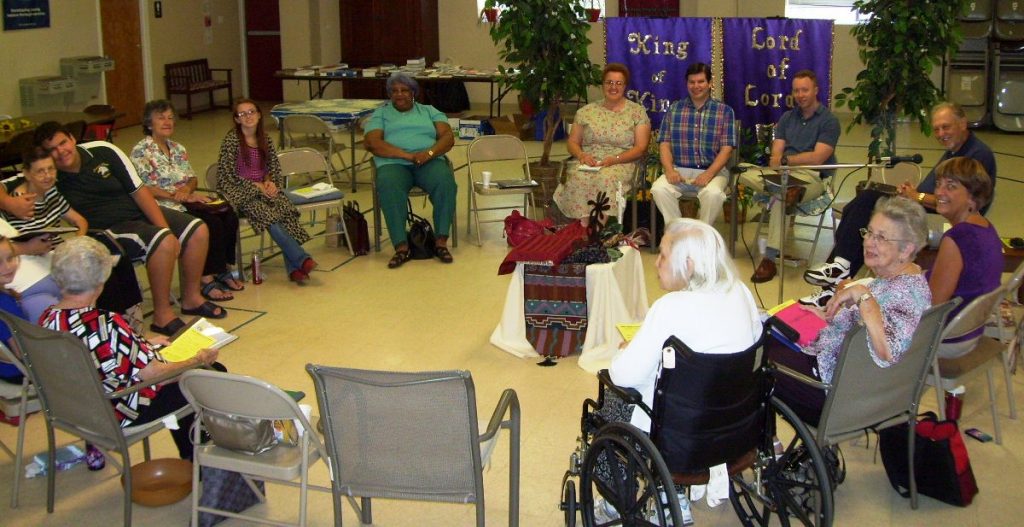Lee Berger, pastor of GCI’s Longview, TX, congregation, shares what he has learned about facilitating fellowship group discussions.

We can all learn much by sharing in the experiences and thoughts of other people. When a group of folks gets together, we hope for a profitable, open, positive discussion—but this result does not automatically happen. I’ll bet we’ve all been involved in group interactions when feelings get hurt, arguments ensue, no one feels safe to speak up, the group leader or another person monopolizes the discussion, or there’s precious little accomplished due to lack of direction. Often, the key element for a constructive discussion is the skill of the leader—the one we refer to as the “facilitator.” A facilitator is one who lessens resistance, smooths the way, and makes the road easier.

If handled properly, small group/fellowship group gatherings can be positive, thought-provoking and life-changing experiences leading to personal growth. Let’s look at some principles that will help any discussion leader be a good facilitator:
- Have clear goals. Is the discussion supposed to follow up on a central theme of a speaker or a biblical passage? Are we aiming for an “ice-breaker” session where we hope the group will share and get to know each other better? Are we searching for comments or input regarding an idea or policy? Whether the discussion is formal or more casual, a good facilitator will keep in mind the overall goal(s) and lead the group toward accomplishment. In fact, it is probably a good idea for the facilitator to state the goal(s) up front so the whole group will be aware of the objective.
- Provide a climate of acceptance. Many people are afraid to express their opinions because they are fearful of what others might think—fearful of being ridiculed, judged or considered “dumb.” Participants need to feel secure before they will share their feelings and beliefs—even if their ideas seem to go against the “normal” grain. A good facilitator will not “put down” sincere ideas, but will control criticism, improper laughter or judgmental comments. The facilitator must be very careful to not “take sides” in issues of opinion, and the participants should be encouraged to express their true thoughts and feelings. Invite everyone to comment, ask questions to encourage wide input, but don’t force individuals to speak; this can backfire and actually decrease overall participation.
- Affirm all legitimate expressions from your members. Let each person know that his or her comments and contributions are appreciated and important. As people participate, encourage future comments by making a point of thanking them. Keep in mind affirmation of a comment does not necessarily mean approval of the idea expressed. Although you don’t want to squelch honest expressions, be aware that some people have a tendency to make insincere comments just for the “shock value.” Your job is to keep the discussion honest and open.
- Discourage members from thinking of you as the “authority.” As a facilitator, your job is to encourage input from the other group members—not to give the “right answers” to all the questions. Rather than spout off all you know about the subject in a “lecture” style, use your knowledge to ask probing questions and wisely direct the comments of the rest of the group (this is quite challenging, but greatly rewarding). When people are giving their comments, be sure they are addressing the group—not talking just to you or looking for your approval. Remember, you serve as the facilitator—a member of the group who is helping make the discussion happen.
- Actively listen to each person (and encourage the rest of the group to be good listeners). God gave you one mouth and two ears. Good discussion group leaders know how to listen and to encourage the rest of the group to be good listeners. Your job is not to monopolize the discussion or contribute the wisest words on each issue. Don’t feel you have to make a “summary” statement after each point. You are the facilitator; encourage others to talk.
- Use group dynamics to maintain discussion. Sometimes, you will have disagreements in your group, someone may come up with an “off the wall” idea, or a person’s behavior may be truly improper. As the facilitator, you should not take sides, unilaterally “correct” the person’s ideas, or immediately confront someone in an authoritative manner. It is always better if any opposing comments or corrective statements come from the group at large rather than from the leader. Give time for the group members to act; often they will see the flaw and address it. As the facilitator, you can ask leading questions to encourage a more reasoned response from the group, or you may have the “offending” party give further reasoning and explanation for their statements or actions. If handled wisely by the facilitator, the group members themselves will defuse most issues. But if someone is truly disruptive to the group, the facilitator may need to step in. If so, handle the correction as lovingly and gently as possible.
- Don’t allow one person (yourself included) to monopolize. Almost every group has a person or two who likes to talk and is perfectly willing to express their opinion on every question. If one person is overbearing to the point of limiting discussion by other members, find creative and positive ways to limit that person’s input while encouraging others to join in. You may, for instance, want to seat the “monopolizer” next to you so you can purposely avoid eye contact, thereby limiting acknowledgement for commenting. Or you might speak to the “monopolizer” in private, commending their passion for sharing their thoughts, and enlist their help in drawing other members into the discussion—partly by limiting their comments to allow more “empty space” for members who are more reticent to formulate their thoughts.
- Arrange seating to encourage discussion. Sitting in rows “theater style” is not generally conducive to discussion. Instead, have everyone sit in a circle or semi-circle or around a table. Don’t allow some to sit behind or outside of the main group; help everyone feel part of the group—not an outsider.
- Don’t be afraid of silence. Many discussion leaders are intimidated by silence in the group. Their first reaction is to fill the silence with a question or a comment. Learn to feel comfortable with silence. Realize there is often a message in silence as much as in talking. Discuss the silence with the group. “What does the silence mean?” Are they deeply considering a “heavy” question, was the question not clearly stated, are they embarrassed to voice their thoughts, do they feel intimidated by the group? Wait it out for at least 30 seconds; allow time for thought and response. If necessary, ask the question from a different angle or move ahead and come back to that question later.
- Try to keep the discussion under control. “Control” here does not mean heavy-handed, narrow-minded, straight-as-an-arrow authoritarian regulation. Remember, as the facilitator, you’re striving to encourage input from the whole group toward a positive outcome. As such, there may be times when you need to limit or re-direct conversation for the good of the group, or occasionally even lovingly admonish a member who may stray too far out of line. Be aware of the flow of the discussion. Sometimes the discussion may become sidetracked from the main issue. You will need to decide whether or not to pursue that issue and see where it leads, or whether to redirect the conversation back to the original subject. If interest is high in the digression and the direction seems profitable, you may want to stay with it. In other cases, you may say something like, “We may come back to that subject later, if we have time. Right now, let’s finish our discussion on….”
- Model and encourage respect. There are many ways to teach mutual respect. How about, “Only one person talks at a time”? Each person’s opinion is worthwhile and deserves to be heard. Or, “There is no such thing as a dumb question or comment.” Asking questions and sharing views is a great way to learn. “No personal put-downs” is a good rule to teach respect. If someone disagrees with or questions another’s comment, they are free to express their opinion of the comment, but not of the person who made it.
- Maintain confidentiality. Confidentiality is a key to a healthy discussion if the exchange involves any type of private personal information. If the points above are successfully employed, group members may feel moved to share feelings or facts of a personal nature—to open up some deep parts of their soul. It is very important that the whole group agrees to maintain personal information as totally confidential to your group. Otherwise, trust is broken, feelings are hurt and the discussion will only touch on shallow, generic subjects. Make sure everyone understands, “What is said in this room stays in this room,” and repeat this principle often. (An exception to confidentiality would be if the person speaks about causing harm to themselves or to someone else—then get help).
Small group discussion facilitators have a crucial role in creating the environment most conducive to learning, sharing and growing. It’s often in small group settings that God works miracles of spiritual formation that change people’s hearts.
_______________
Note from editor: for additional tips on facilitating small group discussions, see a previous article from Lee at https://update.gci.org/2015/08/church-in-the-circle/ and training videos on GCI’s Faithtalk Equipper website at http://faithtalkgroups.blogspot.com/.



Hi Lee and Sue, Thanks for the information on small groups very informative and Spirit led.
Blessings,
Tom and Sandy